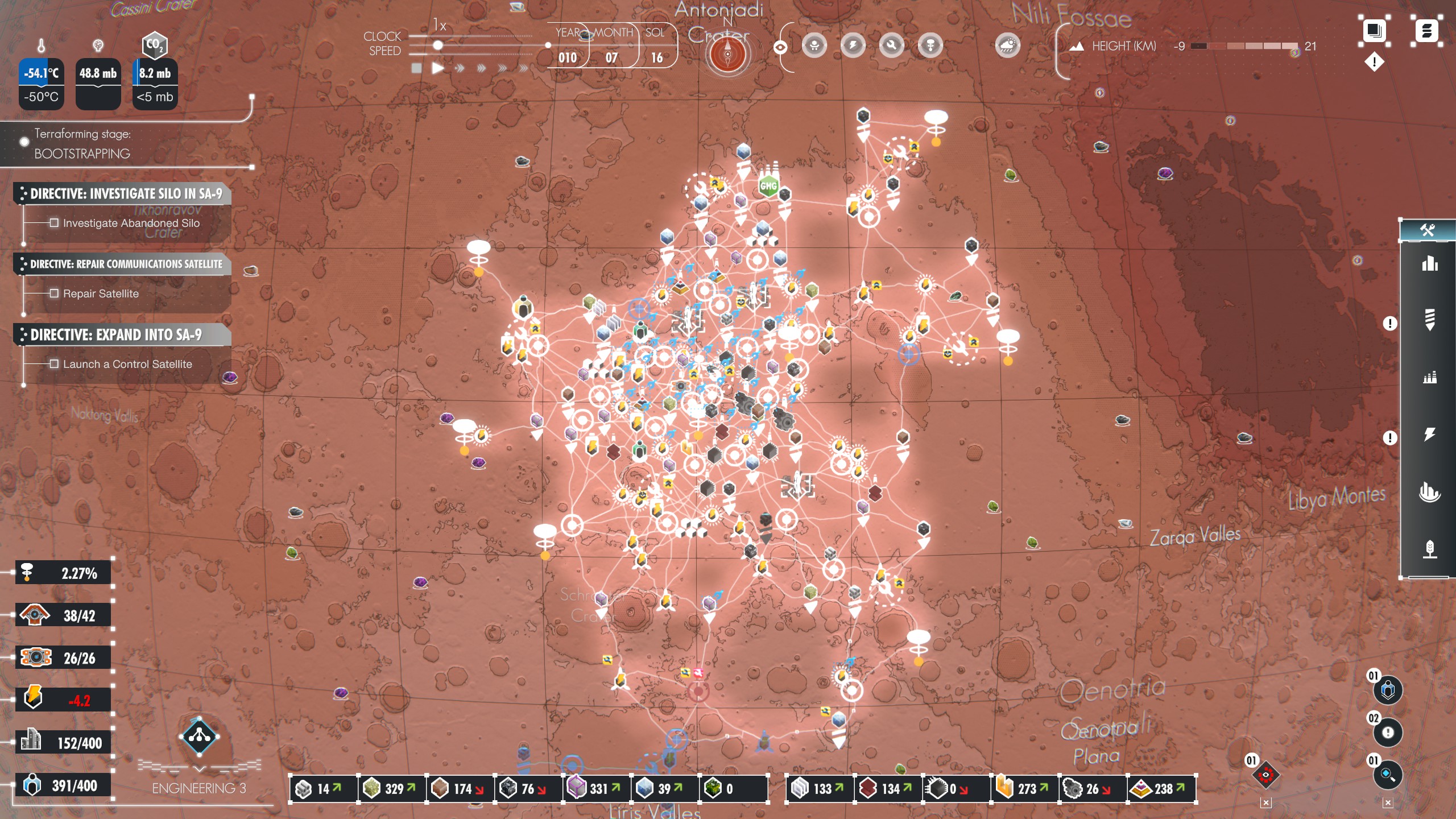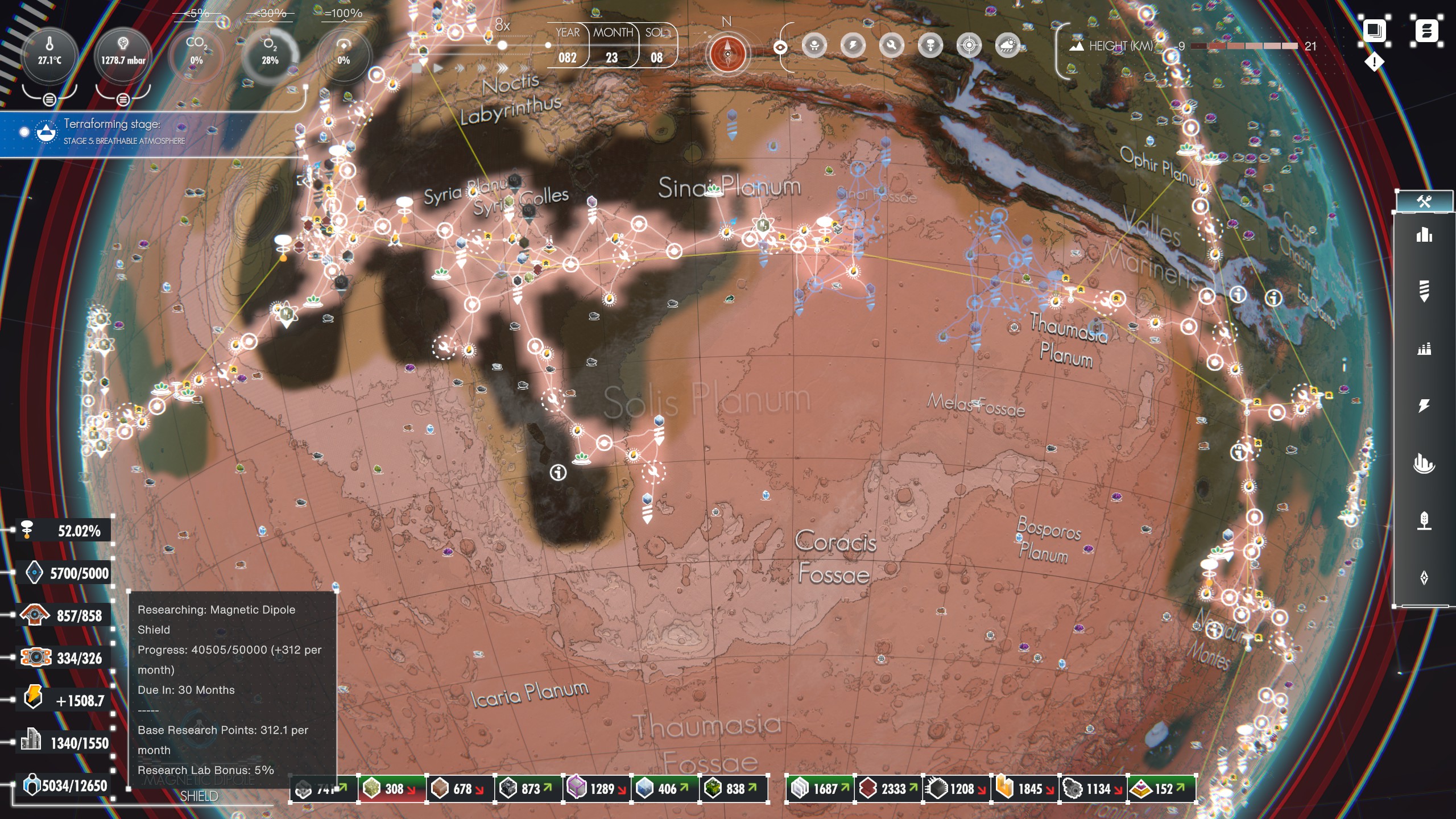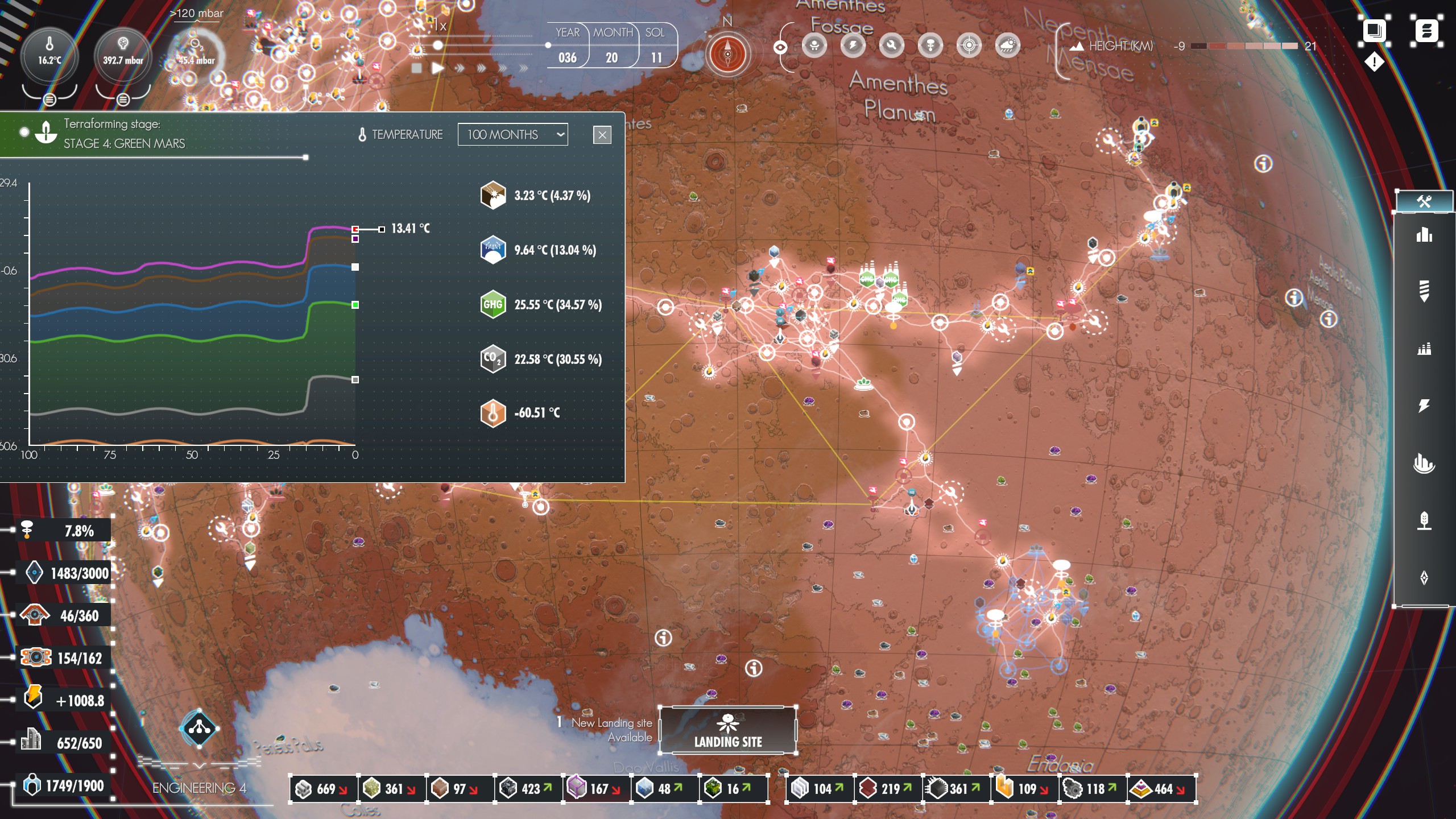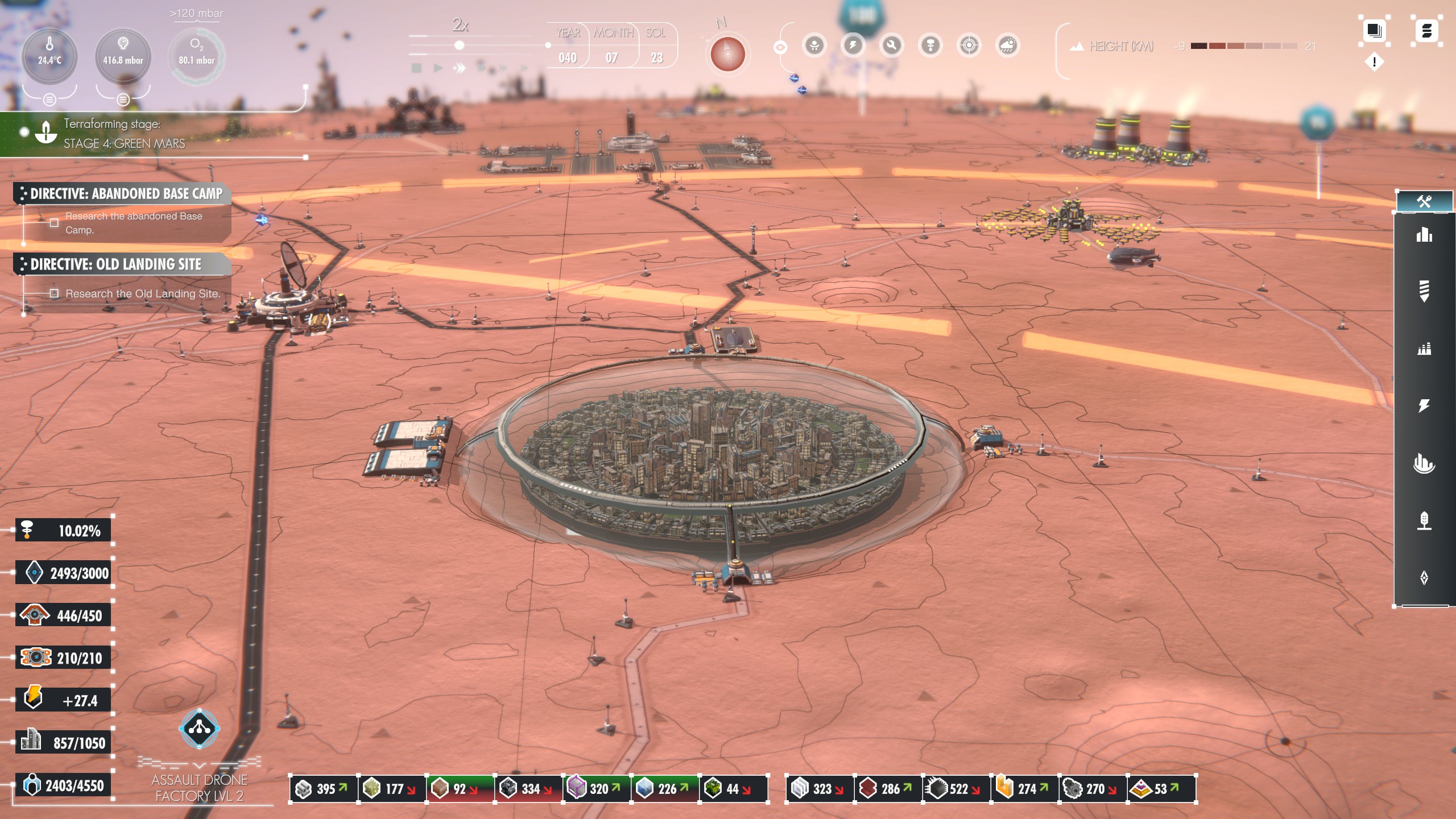Our Verdict
Hard science, harder simulation, and narrative innovation make Per Aspera a real gem.
PC Gamer's got your back
What is it? Grand-scale Mars colonization and terraforming management sim with a novel narrative element.
Expect to pay: $30/£24
Developer: Tlön Industries
Publisher: Raw Fury
Reviewed on: AMD FX-8350, Nvidia GeForce GTX 1070 Ti, 32GB RAM
Multiplayer? Nope.
Link: http://per-aspera.vg/
Here on Earth, they tell me we have too much carbon in the atmosphere. So, as I work to terraform Mars in Per Aspera, I figure that keeping CO2 levels up shouldn't be big concern. I've got a lot of it, and I need it to be oxygen, so I just start seeding the surface with genetically engineered lichen. The lichen turns carbon dioxide to oxygen, everybody wins. I assume it'll keep itself in check well enough.
It was about when the atmospheric oxygen percentage hit 50—dwarfing our 20 percent here on Earth—that I realized that I was very, very wrong. Spontaneous fires started to break out in every factory and mine across the planet because even the slightest spark could ignite the air.
Perhaps the science of terraforming Mars is more complex than I'd thought.
That's the premise of Per Aspera, a novel combination of planetary science simulator, hardcore management game, and dynamic narrative experience. You play as a newly awakened artificial consciousness, AMI, whose job is to establish an autonomous colony on Mars in order to prepare it for a permanent human presence, and ultimately terraform the planet into one suitable for "Earthian" life. AMI's story plays out in audio transmissions voiced by a star-studded cast (Troy Baker, Phil LaMarr, Laila Berzins, Yong Yea, Lynsey Murrell, and Nneka Okoye). It's a series of branching moral choices—some simple, some complex, all rife with uncertainty—that runs alongside what would otherwise be a very pretty, if standard, city-building management game. Those choices lead through a variety of small stories, a larger central mystery, and several different game endings.
Do as AI do
Most of Per Aspera is about panning around a beautifully rendered topographical globe of Mars and listening to a pretty nice chill ambient and upbeat techno soundtrack. Your view is AMI's, a stylized vector interface with lots of soft edges and sans-serif fonts. It worked great for me, but those with low vision might need to disable the depth-of-field effects and shadows.
You survey for minerals and establish mines to retrieve resources like aluminum, carbon, silicon, or buried water. You also build factories to transform these resources into finished materials like electronic components or mechanical parts, and then into further buildings and equipment like worker or repair drones. Sometimes you zoom way out and assign resources to a big project in space, like reflective mirrors or asteroid capture. Resources are finite, though, so you constantly need to expand and explore Mars' surface to renew your supply. Build in the wrong order? That might well be game over. Scarcity is concern number one in Per Aspera.
You might realize that you've only got a few dozen tons of aluminum, and a mere 700 still in the ground. To get more you need to expand your base. That means adding new electrical grid elements, new maintenance hubs, and worker control stations reaching towards and encompassing a deposit. It's a sometimes-tedious process. The terrain might get in your way, but AMI automatically maps out optimal road paths with a slick animation.
Per Aspera is a 'blink and it's 3 am' game.
It's one of the most demanding strategy management games I've played in a long time, not just in its complexity but for the moment-to-moment action. Playing, my fingers constantly slid between WASD to pan the camera, the numbers for game speed, and the function keys to activate overlays for power, maintenance, drone traffic, and survey results. Per Aspera is a 'blink and it's 3 am' game. (Worth noting: You can't remap keys at launch. The developers have promised that in an update.)
You're constantly planning what's next, managing your stockpiles of goods, looking at your reserved resources, setting up expansions, and trying to futureproof your choices. You're also catering to your colonists—who are very fickle, choosy, and frustratingly unpredictable. All it takes is a day of missed supply deliveries and a few thousand of them will pack up and head back to Earth, presumably waving at their replacements on the way through the spaceport.
Did I mention there's combat, too? It's a bit of light real-time strategy combat where you build and employ drone swarms against defensive towers as the enemy does the same. It's alright, but there's not much challenge or complexity to it, and it's not demanding at all on the normal difficulty. It really just serves as a story element—and one more layer of management to keep up with.

AI caramba!
Careful pruning of unneeded buildings is a constant task, as is planning for new endeavors. It can be hard at first, with the potential for resource-scarcity death spirals that require you to either abandon large swathes of progress or restart. For example, I abandoned a game due to a lack of electronics production: Not enough electronics to build repair drones quickly, no repair drones to keep the electronics factories running, no electronics factories to fuel expansion. It adds a bit of tension to the early parts, but once you've got a sprawling network of multiple bases, those supply bottlenecks just slow down an already pretty slow endgame.
All of that city-building occurs on top of the terraforming layer, which has you balance elements in Mars' atmosphere and terrain in order to get specific effects. Don't add too much oxygen or you'll get frequent fires, as I found out to my dismay. Don't raise temperatures too quickly or you'll bring on the liquid water, flooding deposits of valuable resources and/or your base underneath new oceans. I drowned a base when I underestimated just how far the sea level would rise after I crashed an asteroid of pure ice into the surface.

Terraforming is fun, if dangerous—like with resource management, you can easily get yourself into untenable situations. There's a potpourri of ways to go about it, with all manner of weird proposals from sci-fi and real-world scientists. Having already finished the campaign, and despite the late-game dragging on a bit, I'm actually excited to try more ways in the non-combat, non-narrative sandbox mode. And that's after spending 30 hours playing it already.
Between the resource management's automated pathfinding and the simulation of a planet's changing atmosphere there's a lot going on under the hood, technically speaking. There are definitely some odd bugs with pathfinding, colonist movement, and order priority. Per Aspera never strained my hardware, but once I had a thousand buildings on Mars there was a real performance hit—most noticeable when switching game speeds, panning quickly, or zooming out to orbit. It's a genre staple, but expect some dropped frames and a bit of chug as you push the limits of what one PC can simulate.
Extraplanetary experiments
Per Aspera isn't only a detailed strategic simulation, but also a sweeping sci-fi tale. It isn't entirely successful as a narrative, but the best parts of the story elevate the management game beneath it. I won't spoil it, so suffice it to say that it's got technothriller intrigue, but it also takes big idea sci-fi seriously, grappling with concepts like the nature of artificial consciousness and the ethics of terraforming a new world.

The story is made by the voice talent, who wring a lot of pathos out of a pretty simple script. Laila Berzins absolutely nails AMI's journey from infantile and newborn confusion into complex brilliance. Troy Baker crushes his performance as AMI's creator Dr. Foster, displaying an emotional range in a way rarely seen outside of the best audio drama. I could go on: Phil LaMarr as a focused military officer, Yong Yea as a devious businessman, Lynsey Murell—a name you're going to be hearing more of if this performance is anything to go by—as the Martian colony leader.
It's similar to the pace that made Hades so beloved this year, though with its own twists and not nearly so lengthy.
The shock and delight of seeing a dynamic narrative in a strategy game can't be overstated. It's an imperfect story, the writing is at times campy or obtuse, but it's a genuine experiment. Bits of the narrative are nonlinear too—they can happen in different orders or not at all in each player's game—but that comes at the cost of some feeling misplaced or disjointed. I had two events that were back-to-back, but the second was definitely supposed to happen before the first. Still, the base of what's here is good enough that even if the bugs I saw never get fixed I'd still recommend it.
In between the bite-size chunks of story and moral decision-making you're thrust back into city-building. Back into the intensity of choices and strategy action until someone bothers to call up the orbiting, ultra-intelligent AI consciousness for a consult again. It's similar to the pace that made Hades so beloved this year, though with its own twists and not nearly so lengthy.
Per Aspera's novel adaptation of nonlinear narrative to fit a strategy game goes over surprisingly well. Combined with a novel terraforming mechanic, slick aesthetics, hard science chops, and classic genre gameplay, this one is definitely worth the time.
Hard science, harder simulation, and narrative innovation make Per Aspera a real gem.
Jon Bolding is a games writer and critic with an extensive background in strategy games. When he's not on his PC, he can be found playing every tabletop game under the sun.


